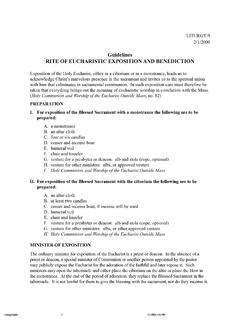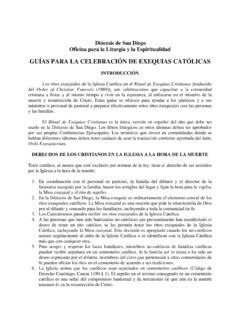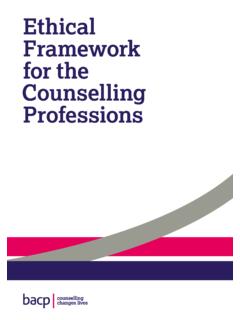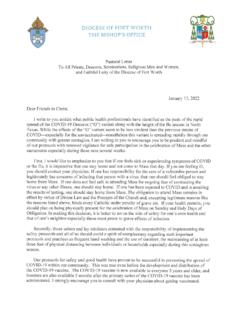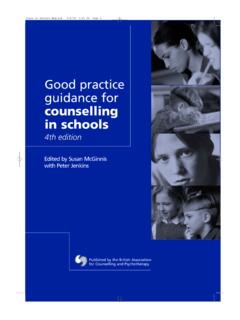Transcription of GUIDELINES FOR CATHOLIC FUNERAL RITES
1 LITURGY 8 10/21/04 Diocese of San Diego Office for Liturgy and Spirituality GUIDELINES FOR CATHOLIC FUNERAL RITES INTRODUCTION The CATHOLIC FUNERAL RITES in the Order of Christian Funerals (1989) are celebrations that enable the Christian community to mourn as well as to hope by focusing on the mystery of the death and resurrection of Christ. These GUIDELINES are offered to assist pastors and their pastoral staffs in effectively preparing the FUNERAL RITES with individuals and families. The Order of Christian Funerals is the only canonically approved liturgical rite in English. Liturgical books in other languages must be approved by their proper Episcopal Conferences. Ministers serving in communities with diverse languages should take care that they are using the current approved translation of the Latin, Ordo Exsequiarium.
2 ENTITLEMENT TO THE MINISTRY OF THE CHURCH AT THE TIME OF DEATH Every CATHOLIC , unless specifically excluded by the norms of law, is entitled to the Church s ministry at the time of death. 1. In coordination with the pastoral staff, the family of the deceased and the FUNERAL director chosen by the family arrange the place and set the time for the Vigil, the FUNERAL Mass and the Rite of Committal. 2. The FUNERAL Mass is ordinarily the central element of CATHOLIC funerals in the Diocese of San Diego. The FUNERAL Mass is a prayer for God s mercy for the deceased and a solace for the living, including the entire faith community. 3. Catechumens may be given CATHOLIC FUNERAL RITES . 4. CATHOLIC FUNERAL RITES , including the FUNERAL Mass, are permitted for a deceased baptized non- CATHOLIC who might reasonably be presumed to desire or prefer the CATHOLIC rite.
3 Such a decision would be appropriate when non-Catholics worship regularly in the CATHOLIC Church or identify with the CATHOLIC Church more than any other. 5. To foster and respect family bonds, non- CATHOLIC members of CATHOLIC families may be interred in a CATHOLIC cemetery. Clergy of other communions may conduct the cemetery RITES according to their tradition, if the family so desires or if it was the expressed wish of the deceased. 6. The Church encourages the burial of Catholics in CATHOLIC cemeteries (Canon ). Burial in the consecrated ground of a CATHOLIC cemetery is a sign of baptismal commitment and gives witness, even in death, to faith in Christ s resurrection. 7. A child who dies before baptism, or a stillborn or miscarried child may be given CATHOLIC FUNERAL RITES if the parents intended to have the child baptized. The remains of fetuses or stillborns should always receive reverent Christian burial if this is at all possible.
4 These remains may be placed either in specific individual graves or in a common burial area. 2 8. The Order for Christian Funerals provides a complete FUNERAL liturgy for children who have died (OCF #234-342). The various texts for a baptized child or a child who died before baptism make these RITES fully adaptable to various situations, and offer consolation for those suffering the extraordinary grief which comes with the death of a child. 9. There is no objection to Catholics making prior arrangements to donate their bodies or parts of them, after certain death, to advance medical science. Upon eventual disposition of the body or its parts, there should be reasonable assurance that the remains will be disposed of in a proper, reverential manner. The family of such a donor should be encouraged to celebrate a Mass as soon as possible after death.
5 Whatever remains of the body after an organ transplant or medical research should be given appropriate burial. The rite of final committal with final commendation (OCF #224-233) offers a model for concluding prayers for the donor and the donor s family. INVOLVEMENT OF THE ENTIRE PARISH COMMUNITY Since the ministry of consolation belongs to the entire Christian community, the entire community is to be involved in caring for the dying, praying for the dead and comforting those who mourn. 1. Regular catechesis is encouraged to help parishioners understand their role in ministering to those who have suffered the loss of a loved one. 2. Parish policies, procedures and ministerial resources are to be developed in light of these GUIDELINES and communicated clearly to parishioners so they can take full advantage of the services available to them at the time of death.
6 3. FUNERAL directors provide an invaluable service to families and to the Church. Often the FUNERAL director provides the first response to a family who has experienced the death of a loved one. It is important for parish staffs and local FUNERAL directors to cultivate an attitude of mutual respect and effective collaboration. Annual meetings with FUNERAL directors within a parish or cluster of parishes are encouraged. FUNERAL directors are encouraged to include study of the Order of Christian Funerals as part of their regular in-service study, and are invited to call upon the services of the Office for Liturgy and Spirituality. MINISTRIES IN THE RITES OF THE ORDER FOR CHRISTIAN FUNERALS In keeping with the norms found in the Order of Christian Funerals, priests and deacons are to share the responsibility for planning and implementation of the Order with qualified lay ministers.
7 1. Priests, as teachers of faith and ministers of comfort, preside at the FUNERAL RITES , especially the Mass; the celebration of the FUNERAL liturgy is especially entrusted to pastors and associate pastors. When no priest is available, deacons, as minister of the word, of the altar, and of charity, preside at FUNERAL RITES . When no priest or deacon is available for the vigil and related RITES or the rite of committal, a layperson presides (OCF, n. 14). 2. The rite, Gathering in the Presence of the Body (OCF #109-118), may be used if a priest, deacon, or parish minister is present at the time of death, or when the family first visits the body. 3. A pastoral visit to the family by the priest celebrating the FUNERAL Mass is an expected part of the Church s ministry of consolation. The ministry of a bereavement group or ministry of consolation is never to substitute for the pastoral visit of the priest.
8 3 4. Part of the priest s ministry to the grieving family may include the offer to celebrate the sacrament of reconciliation. This may be appropriate when the family has not participated in worship for some time. However this does not warrant general absolution. 5. The service of all appropriate liturgical ministers is recommended in the celebration of the various liturgies of the Order of Christian Funerals. Laymen and laywomen may serve as readers, musicians, ushers, pallbearers and, according to existing norms, as special ministers of the eucharist (OCF #15). 6. The preparation of the liturgy can provide consolation for the mourners. However the preparation of the liturgy should never become a burden for the family. The Order of Christian Funerals recommends that family members be involved in some of the liturgical roles, unless they prefer not to be involved (OCF #15).
9 Nevertheless, they might designate the persons to place the pall or appropriate symbols on the casket at the reception of the body at the doors of the church, as well as the persons to bring gifts of bread and wine to the altar (OCF #152). 7. Music selected for the Order of Christian Funerals should be appropriate for Christian prayer and conform to liturgical directives. The texts of the music should express the paschal mystery of Christ s passion, death, and resurrection. This is especially important for the Song of Farewell. Popular non-religious songs are not to be used in the liturgy. THE VIGIL The vigil is often the first time family, friends and members of the parish community gather in remembrance of the deceased, for prayer and support. The vigil may be celebrated in the home of the deceased, in the FUNERAL home, or in the church. 1.
10 During the wake, the Vigil for the Deceased is the principal rite celebrated by the Church in the time following death and before the FUNERAL Liturgy. The practice of scheduling a specific hour for the Vigil for the Deceased is encouraged in order for more of the faithful to participate in this liturgy. Devotions such as the rosary are permitted at other times during the wake. 2. The Vigil for the Deceased may provide a chance to take part in the FUNERAL RITES for those unable to participate in the FUNERAL Mass or Rite of Committal. 3. When no priest or deacon is available, it is permissible for a trained lay minister to be designated by the pastor to preside at the Vigil for the Deceased, providing the person has been formed in an understanding of the Order of Christian Funerals and is also skilled at leading public prayer. 4. After the Prayer of Intercession or at some other suitable time during the Vigil, it is appropriate for a family member or a friend to speak in remembrance of the deceased (OCF #62).
